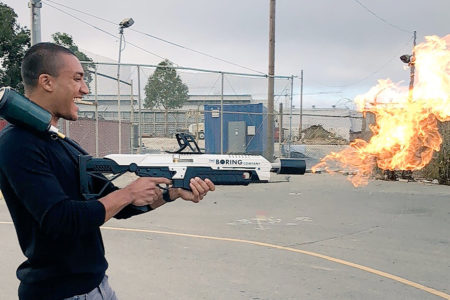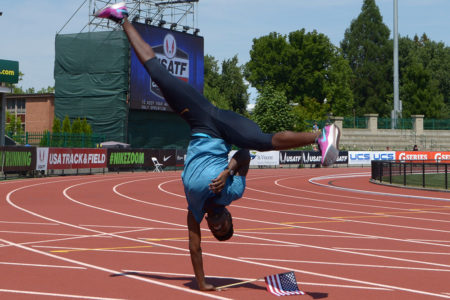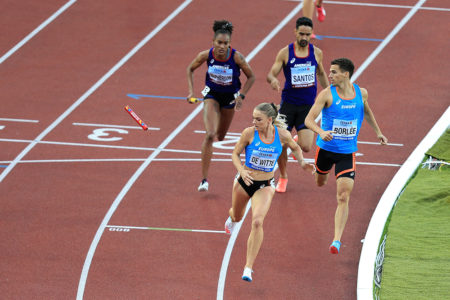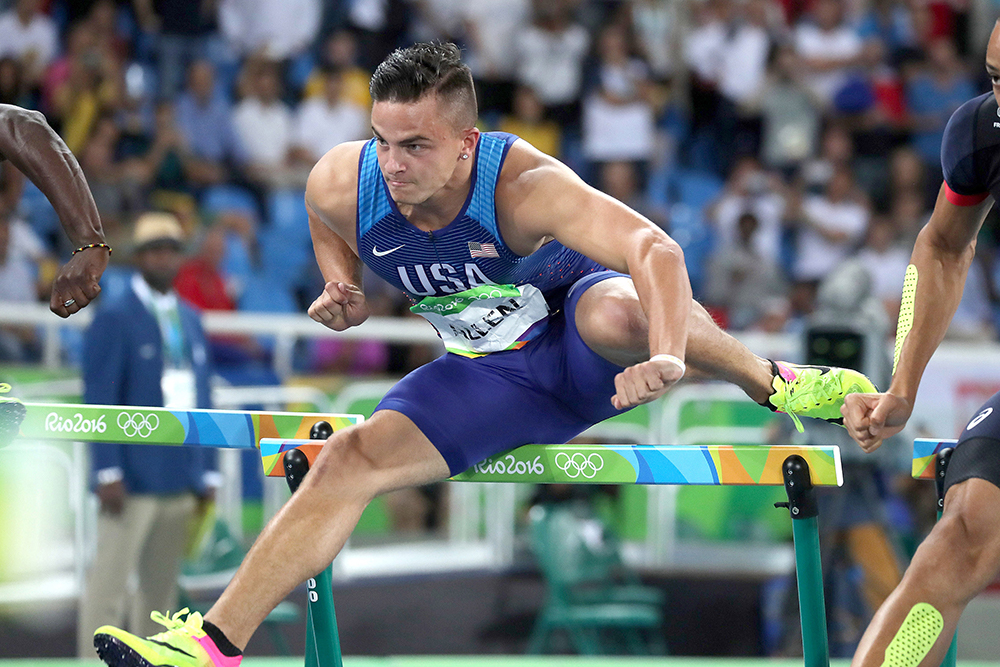
The ’18 season we just wrapped marked a new chapter in Devon Allen’s hurdling life. Or maybe the year is better described as the opening page of a sequel volume to the first book. You remember the story of the Oregon football player whose first college track season took him all the way from 14.04 in March to 13.16 and NCAA & USATF crowns just over 3 months later and Ranking spots of No. 4 in the U.S. and 10 in the world.
Allen, with a good argument (read on), disputes the conventional wisdom that he hurdled up out of nowhere in that 2014 campaign. The Phoenix prep had scored high T&FN High School All-America positions in ’12 (No. 2) and ’13 (No. 4). Nonetheless, on the prep all-time list he never cracked the top 10, but had he been born 20 days later he’d have finished his yearling college season as the World Junior Recordholder.
Then his football career dished up more drama, heartbreak and redemption—twice!—over the next 27 months. You know that story. First, in the ’15 Rose Bowl the Duck receiver, who had caught 41 passes for 684 yards and 7 touchdowns in the regular season, tore his right ACL running back the opening kickoff. He had surgery, missed the ’15 track season entirely (but not his soph gridiron campaign) and rose to every occasion in the hurdles in ’16: NCAA crowns in and out, a 13.03 victory at the Olympic Trials and a 5th-place finish in Rio.
Fantasy Island stuff. And then two games into fall football after the Olympics on punt coverage against Nebraska, Allen tore an ACL again; this time it was his left knee. He lost that season but returned in the hurdles, having turned pro over the winter, to place 3rd at USATF. He then reached the semis at the Worlds 11 months after his second knee reconstruction.
This year, relocated back to Arizona with his Business Administration degree complete, Allen won his third USATF hurdles title in an at-the-line squeaker over Florida Gator Grant Holloway. Guided by a new coach who is also his old coach, Allen, now 23, acquitted himself well in 6 Diamond League meets, including 2nd in London and 6th at the DL Final. The only major foe he never headed this year was DL titlist Sergey Shubenkov.
We checked in as Allen began his fall break eager to hear what the Phoenix phoenix had to say about this season, his craft and his future. The man, as that conversation shows, is a true student of his event.
T&FN: What’s your assessment of your season just concluded?
Allen: I think overall it was pretty good. I kind of set out a few goals and I got a couple of those done. Didn’t get a couple of them but that’s how it works sometimes, but I think overall it was pretty good. I competed pretty well at pretty much all my meets, won USAs, so I can’t really complain. Obviously I would have liked to run faster but sometimes with training and all the stuff that goes on it just doesn’t happen.
T&FN: This was a big transition year for you in many respects. You’ve relocated back to Phoenix where you grew up. You’re working with a new coach. What’s your training situation?
Allen: My coach is Tim O’Neil. He was my coach in high school; he taught me how to hurdle my sophomore year when I started hurdling. And then my two training partners now are Johnathan Cabral, he’s the Canadian 110 hurdles champ and he got 6th-place in the Olympics.
T&FN: Also a former Oregon teammate of yours.
Allen: Exactly. He was my Duck teammate so he moved down to Phoenix to train with me and he’s living with me now. And then Freddie Crittenden, who actually had a great end of the season this year. He moved to Phoenix like the first week of August and he’s training with us as well.
T&FN: What made you decide to relocate from Eugene? Family, weather?
Allen: Yeah, yeah. My family’s in Phoenix. My college coach, Jamie Cook, got the head coaching job at Naval Academy, which is awesome for him; I just didn’t want to move to Annapolis. So I went back home and I’d been talking to my high school coach a little bit about the possible change because Jamie knew he was going to be going to Navy long before I left Oregon. So I reached out to Tim, said, “Hey, you want to be my coach?” And he said yeah. Him and Jamie have similar coaching styles so it works really well. I needed to move somewhere for my first year away from college and going home’s always a safe bet. Especially if you don’t know what the future holds. It’d have been tough for me to go somewhere different like Texas or California, Florida or wherever, start fresh and be super successful, my first year anyway. I think it worked out pretty well. Johnathan and I ended up healthy and Johnathan ran a lifetime best outdoors [13.34] and indoors ]7.62]. I ran a lifetime best indoors. And lifetime bests in the 100 and 200 [10.26 and 20.52]. So I feel confident with the training. Strength- and speedwise I feel really good, hurdling I feel really good. I think I just kind of pooped out towards the end of the season. We’ll be able to take that information and learn how to treat next year, especially with it being a long season.
T&FN: You’ve bought a house?
Allen: Yeah, I bought a home and me and Johnathan and Freddie are all living together.
T&FN: Hurdles House! What do you guys do for fun in your spare time?
Allen: Oh, nothing. We don’t do anything. We play Fortnite for 6 hours.
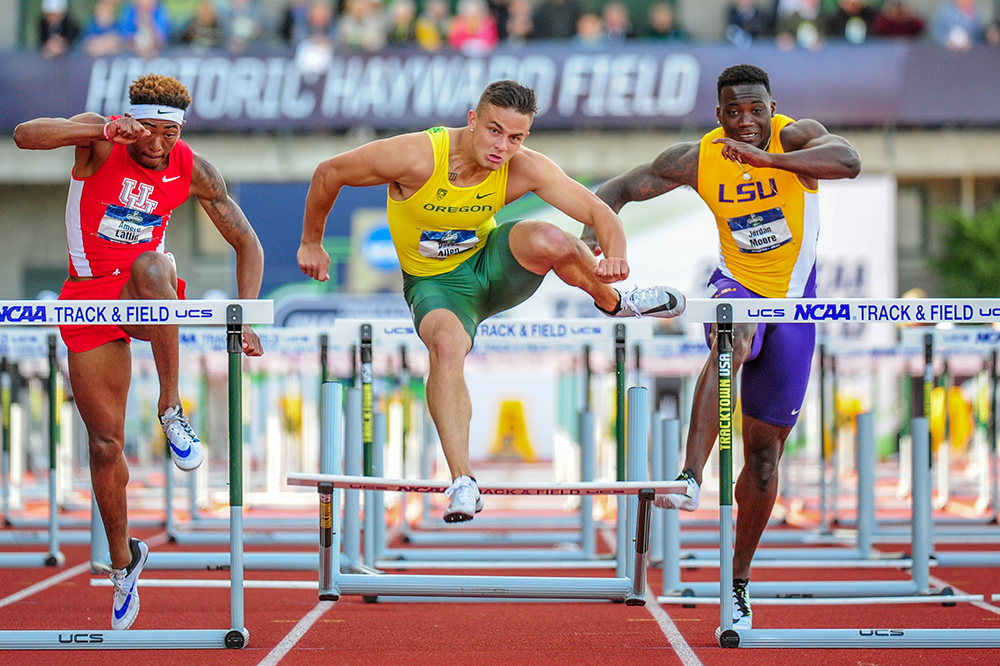
T&FN: Along the way this year you beat everybody who’s anybody in the 110 hurdles except Sergey Shubenkov.
Allen: Yeah, I think so. And that’s the thing, especially in this event. You see the best guys always racing each other. Some people are hot like Sergey this year but overall it’s kind of back and forth all over the place. Which is cool. It’s not like the women’s 400 right now or the women’s 200, where the same people are winning every time.
T&FN: You say you set goals. It goes without saying, winning the U.S. title had to be one, keeping that even-year streak alive. Grant Holloway didn’t make that easy but you got him at the end in Des Moines. What else was on the docket?
Allen: I was trying to transition into 7 steps [to the first hurdle] this year. My first couple outdoor meets I did end up doing it. I ran at the Drake Relays with 7 steps and the Oregon Twilight. I think I’ll get it down and use it for all my races next year. I just kind of had a hard time with injuries and stuff getting it down in practice. That was the biggest thing for me really: to be consistent with the 7 I had to feel good at practices. Right after Prefontaine I was lacking that. So that’s one thing I want to get better at and I also want to run into the 12-second range. Which I didn’t this year. I didn’t run terribly slow, I ran in the 13.20s a couple times [13.23 Paris DL, 13.29 Lausanne DL] and 13.30s pretty much every race.
T&FN: You hurdled in four indoor meets this year and PRed (7.49) at the USATF Champs. I checked and over the senior barriers you’ve hurdled in a grand total of 11 indoor meets lifetime, one of those being the ’16 NCAA, which you won. Did you 7-step indoors this year?
Allen: No. When we came back in April after indoor I decided we were going to try 7. I did 7 steps in the two weeks leading up to Drake. At Drake, with being new at 7 steps, it kind of took some pressure off. I kind of told myself, “Hey, if you’re behind, don’t worry. You’re always going to come back and catch everybody.” So it helped me relax a little bit, but then it got to the point where I was like, “Well, shoot, Drake Relays is a good competition. Now we’re starting to run against Sergey and Omar [McLeod] and Orlando [Ortega] and all those guys; I need to be on top of my game.” So I decided to head back to 8 and just save 7 for next year.
T&FN: You ran a windy 13.13 at Pre, your fastest all-conditions time of the year. Did you 7-step there?
Allen: Actually, right after Drake and leading into the Twilight I was having some knee issues and I remember one day in practice we were doing 7-step stuff and I was like, “Man, I can’t get there today.” So my coach, Tim, and I decided for this season we’d just stick to 8 because that’s easy, I can always do that in practice, I can always do that in a race. The only thing with that is then it became kind of hard to 8-step. I’d gotten used to the 7-step rhythm but now I was going back to the 8-step rhythm so I had to figure that out again. It was a little frustrating.
You could kind of tell, in some of my races when I was feeling really fast, I was feeling good fitness-wise, around USAs and Paris Diamond League, my start wasn’t there. I was so far behind at the beginning of the race and I closed. Then I started getting my start together towards the end of the season but then fatigue started setting in with the [long] season, my first season with preseason training before January. Which was interesting, I learned a lot from that. I’m a little disappointed I didn’t run faster, I didn’t compete better, toward the end of the season, but sometimes your body has it and sometimes it just doesn’t. You can’t get too down on yourself.
T&FN: Is 7-stepping seen as almost de rigeur these days?
Allen: If you go back in history, 7-stepping is not really necessary. Greg Foster, Renaldo Nehemiah, Roger Kingdom, Colin Jackson, Allen Johnson, Terrence Trammel—who were all different hurdlers, a lot of those guys big, a lot of those guys smaller—all of those guys 8-stepped. It wasn’t really until the last 10 years or so that people started doing 7 steps. I do get how it could be better. If you think of a sprint hurdles race in terms of a 100 meters, if you take 44 steps in a 100 meters and you can cut out one step you’re going to run a little bit faster. So if you can go from 44 to 43 without being super overstriding, you’re going to run faster. That’s really the thing that made Usain Bolt look great, right? He took 3 or 4 less steps than everybody else and he beat everybody. So I think if you can be competitive to the first hurdle with 7 steps and put yourself at a better takeoff velocity… I think being at top speed into the first hurdle is what a lot of those 7-step guys are doing now. It allows them to accelerate all the way through—even thought it might be a little bit slower for the first half of accelerating to the first hurdle, as opposed to putting on the brakes, which sometimes I do. Sometimes I’m running so fast to the first hurdle that I have to cut my last two steps so short that I’m actually slowing down and not accelerating through it.
T&FN: I see. You have great flat speed so perfecting 7 steps should help you leverage that.
Allen: You really just want to accelerate all the way through, so whatever works for you, you should do. I think 7 steps, it works for a lot of those guys and they feel comfortable with that. They push out long the first couple steps and then 5, 6, 7 they accelerate through. I felt like it was working for me there [in the three weeks practicing it this year]. I just wasn’t that comfortable with it yet. Eight steps works for me but sometimes when I’m really fit and really fast toward the end of the season I have a hard time cutting those last steps short enough to where I’m in a good position to actually hurdle the hurdle. I had a few races this year where I just banged the first hurdle because I was too close. And then on top of that couldn’t accelerate through it without slowing down. It’s kind of just what feels good and I think me and my coach have decided so far that I’m going to go to 7 steps now. I feel strong enough and I have a big offseason, especially with World Champs being in October. I’m going to start lifting here in a month and I’ll probably have a big weight phase from October to January. So I should have strength enough to be able to do that.
T&FN: You’ve mentioned the names of several great hurdlers from 20, 30, 40 years ago. For a 23-year-old guy, you seem quite familiar with the event’s history.
Allen: Well, when I started hurdling obviously I started doing research on it. But my coach is a big fan of those guys. Roger Kingdom and Greg Foster actually live in Arizona so I actually run into them here and there every once in a while. Colin Jackson obviously is a legend. So it’s just being a student of the game, really, and just enjoying watching those videos and stuff like that.
T&FN: Is there any one hurdler whose races you watch more often?
Allen: I like to watch Allen Johnson a lot, to be honest. He was super-fast. He ran 20-point in the 200 and the 4×4 a couple times for world teams. He’s just really explosive and really technical, I’d say. He had a super-aggressive lead leg like me, as well, where sometimes he hits the hurdle on the way down, riding it down with your hamstring. His style’s probably the most similar to mine so I like to watch him. And he was just so dominant when he was running that pretty much every race you watch was him winning by a large margin.
T&FN: Allen’s a really personable guy. In light of that, I found it interesting that his college coach, Curtis Frye, said he used to motivate himself by working up anger at something, imagining he’d been disrespected or the like to amp himself up. How do you psyche up for competition? What’s your mindset?
Allen: I’m super competitive. This is my job now so I think in terms of competitors taking money from me. I always go in expecting to win every race, right. First place in the Diamond League is 10-grand so if I don’t get 1st place whoever just beat me just stole $4000 from me. You know? [laughs] That’s kind of how I treat things. Maybe that’s a little overboard but it’s competitive. I mean, we’re all friendly. Of the events, I think the hurdlers are probably one of the most friendly groups to each other. But it’s really competitive and that’s what makes the sport. Especially our event right now. Omar running so well, Sergey, Orlando, Ronald Levy, Hansle Parchment, me, Freddie Crittenden, Aries Merritt, Jarrett Eaton, Grant Holloway, those guys. Super-competitive right now in this event, and other than Sergey kind of running away with it this year, you go into every race and you have to perform and you have to compete in order to win. It’s pretty cool.
T&FN: Your PR, 13.03, has you right on the cusp of sub-13. What will take you there?
Allen: Just becoming a better hurdler. This is like my fifth or sixth year as a hurdler. It’s still pretty new as an event so I’m still learning things that I’m good at, things I need to take advantage of. Obviously there’s my speed so my thing used to be just running and going as the biggest thing. But I think technically I’m getting better with my arms; that’s a big thing I’ve been working on. But it’s kind of hard to tell—especially with a new coach. He’s a new set of eyeballs on me so he has a lot of information to take in, a lot of things to see and a lot of habits that he sees I’m doing, some good things and some bad things that I need to break as well. So for me I just need to be a little bit cleaner and improve my mobility overall; I’ve always kind of struggled with that as an athlete. I think I could be more mobile.
T&FN: By “more mobile” do you mean more flexible?
Allen: Yeah, not so much flexible. I think people overuse that term a little bit. I think flexibility’s important but to be a sprinter you need to be high-strung like a rubber band and be able to kind of explode. So I think more mobile in terms of range of motion in my legs and back and stuff that controls the kind of movement when you hurdle. Especially low back, hip flexors, stuff like that. I think that’s the biggest thing. Some hamstring strengthening is needed. I think that’s where my knee pain started. Not weakness but some lack of balance. And I think my right leg, it being the least recent ACL leg, is much stronger than my left leg. So me just overcompensating throughout the whole year kind of wears and tears on your body.
But I think my speed’s good. Obviously I want to get faster. I want to be the second guy [after Omar McLeod] to go under 10 seconds in the 100 and under 13 in the hurdles. So speed’s a big thing for me but I think my mobility is going to be the thing I’m going to focus on the most.
T&FN: What do you do really well as a hurdler?
Allen: I like to think I have a super-aggressive lead leg when I am hurdling well. I have a slight bend in it, coming up and down. My coach in college, Jamie Cook, found that that worked well for me. I think just being in a good position running off the hurdle is probably the most important thing. You see a lot of hurdlers who all look different but the thing that’s all similar is the position that they’re in. I learned that in college as well, so now I’m just trying to take everything I learned and just refine it, develop it, get a little better.
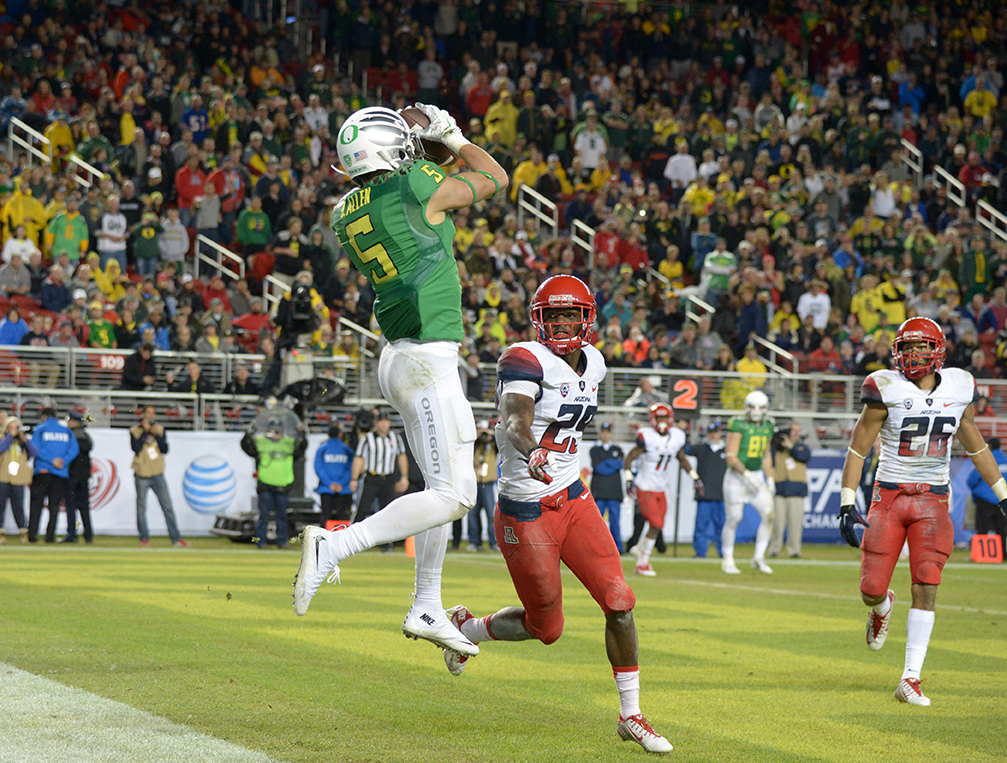
T&FN: Given your success in football, a decidedly higher-profile sport in this country, how important was track and hurdling to you in high school? Did you give it much thought?
Allen: It was important. It’s just one of those things that I felt football was going to get me to college on a scholarship. So I spent most of my time doing that. I always started track in December or January and I was always done with track right after State, around June. I never had too long of a season. But it was definitely important to me. I’m not gonna lie, I love track & field, I love running around and doing what I do now. That’s been my passion for a while and I think me focusing on it’s just going to help me accomplish my dreams in the future.
T&FN: Your breakout as an Oregon frosh in ’14 was mind-boggling. You ran 14.04 in your first outdoor race over the college highs. Three months later you were the NCAA champion, the USATF champion and a 13.16 guy. Two years after that, despite missing 2015 entirely due to knee surgery, you placed 5th in the Olympics. What was that whirlwind like?
Allen: It was awesome. A lot of people think I came on the scene randomly in 2014. But in 2012 I had run 13.30, 13.40 as a junior in high school [13.52, No. 4 prep that year, and his 13.32w led the all-conditions list]. My senior year was kind of a dud year. I think I ran 13.48 but I tore some ligaments in my ankle during the football season in November. So I didn’t actually get to start running until April of that track season. I didn’t really get to train or anything, I just showed up and did it so that’s why I didn’t progress more that year. I think I would have run faster, maybe 13-oh or so. But then when I got into college I was healthy, fit and ready to roll. And the 3-inch height difference wasn’t too much for me. I’m not 6-5 or anything but I’m not short by any means.
T&FN: So now you have a little time to recharge the batteries. You’ve mentioned that you’ll undergo minor surgery to remove the screws from your two knee repairs. Anything fun planned?
Allen: My girlfriend’s from Melbourne, Australia, so I’m going to go visit here. She’s actually here in Phoenix with me right now so we’re hanging out. But I might go out to Australia. I really like Japan so I might head out to Tokyo again.
T&FN: Couldn’t hurt to do a little more reconnaissance of the ’20 Olympic host city.
Allen: It’s awesome. I went last year but maybe Tokyo. I’m thinking if not, maybe Bali or Fiji or Hawai‘i or something like that. Hawai‘i is a shorter trip for me so maybe I’ll spend a few days out there.
T&FN: You’ve mentioned you’d like to try to run under 10 in the 100. Once the ’19 season starts might you devote some time in the spring to flat sprinting?
Allen: Yeah, I think all the early season stuff I’m going to be running 100s, 200s, for sure. My coach wants me to do a couple 400 hurdle races, which I’m not opposed to just to get some fitness.
T&FN: You don’t, then, view the pain of the long hurdles as a no-go zone?
Allen: No, I’m gonna go for it. I think I can run pretty quick. It’s a really competitive event as well right now. It’s exciting to watch and I want to be a part of that.

